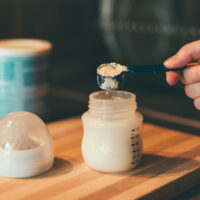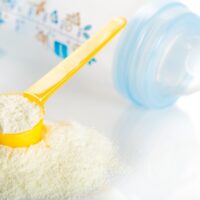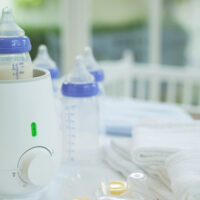Parents of infants across the United States are panicking as they worry about how to feed their babies amidst this severe formula shortage. Families are driving hours on the search for a can of powdered milk, or searching online and being forced to pay outrageous prices from those out to make a buck off this calamity.
As people find the formula, they are buying up as many cans as possible frantic to feed their infants while others are searching empty shelves fearful about providing the necessary food for their precious little ones. Simply put, this is a crisis right now in the United States. And many families are desperate, scared, and angry.
How Did The Shortage Start?
The problem with the formula began in February, 2022 when Abbott Laboratories, a major producer of infant formula, recalled several brands and shut down a large plant in Sturgis, Michigan after four infants became severely ill from consuming contaminated formula. Sadly, two of the infants died and Abbott voluntarily shut down the factory as the Food and Drug Administration investigated Abbott Laboratories.
In their Michigan plant, a trace of a pathogen called Cronobacter sakazakii was discovered and the FDA recalled several brands of powdered formula, including Similac, Alimentum and EleCare. The bacteria, Cronobacter sakazakii, causes life threatening illness such as sepsis or meningitis. If you have those formulas, you can check if your formula was part of the recall by clicking here. Liquid formulas were not part of the recall.
Added to the recall, the supply chain issues and labor shortages across the US have only increased the struggle to produce enough formula for the infants reliant on the powder milk to survive.
What Is Being Done to Relieve This Shortage?
While the shortage of infant formula will not be resolved overnight, there are several action steps happening simultaneously to put formula back on the shelves as soon as possible. President Joe Biden has invoked the Defense Production Act to speed up formula production and for overseas formula production to meet US Nutrition Standards to be imported into the US to help with this crisis. Another way that the Defense Production Act will help is by redirecting needed resources and ingredients to formula production over other customers who have ordered those same resources.
President Biden has also initiated Operation Fly Formula where the Department of Defense will use commercial flights to fly in infant formula that meet US Standards to restock shelves as soon as possible.
The Abbott Laboratories Michigan Plant is also reopening to increase domestic production, however it will take 6 – 8 weeks to see these cans available for purchase. While this will take time to complete, hopefully the shortage will soon be over and parents can breath a deep sigh of relief.
But What Now?
Meanwhile this is very frightening for families with little ones, and as the grandmother of a 5 day old grandson, I understand that fear. Therefore, it is time to do everything possible to find ways to feed your precious baby. Think outside the box.
- Call your Pediatrician – They are given samples by formula companies so they may have some available for you. Unfortunately, due to the overwhelming shortage, they may also be in short supply. But it is definitely worth calling to see how they can help. They may also be able to offer other tips to help you supplement your child’s feeding, depending on their health and age.
- Call Formula Companies Directly – While they are also under a great amount of stress right now, they may have samples that they can send you. Enfamil and Similac both have rewards programs that you can enroll in so that you receive both free samples and coupons.
- Consider Switching Formula – IF your baby is healthy, you could switch formula to an equivalent brand, including a store brand. Often the generic or store brands contain the same ingredients as a name brand, so it could be safe to switch. If your baby has special feeding needs or allergies, please do not switch unless you talk to your pediatrician first. Remember when switching that formulas are separated into 4 categories: Basic (milk based), Soy, Sensitive (free of lactose), and Hypoallergenic.
- Ask Friends & Family – Get a team of friends and family to help you search for your formula. When they go to any stores, ask them to look in the infant aisle for your particular brand. The more people searching, the better chance of finding some.
- Ask on Social Media – Post it on your social media sites asking if anyone has any extra formula. I recently saw a friend post that she was desperate and she had several comments from other Mom’s who had extra and did not need it. So just by making a post on Facebook, she was able to get 3-4 cans for her baby. There are also many parenting sites on social media that may be able to help.
- Search Online – It is difficult to find formula online but just search several times per day as you are looking at your phone. I have seen some stores have a supply listed at times so keep looking. Liquid formula is also more readily available online. While it is more costly, it is a bit easier to find. Remember to look at REPUTABLE companies that you trust are not scams.
- Look Everywhere – While we often purchase formula at a grocery store, start looking at other stores that also carry infant items. Check your local pharmacies, warehouse stores, and chain department stores. Local food banks may be a good resource to help you find formula. Always look at expiration dates because you do not want to feed your baby expired formula.
- Contact WIC – If you are low to middle income, check with WIC to see if you qualify for their program that focus on nutrition and health for Women, Infants, and Children (up to age 5).
- Consider Breastfeeding – While not everyone can breastfeed for a variety of reasons, if you are about to give birth, you may want to consider it. If your newborn is still very young, but you did not begin breastfeeding, it is sometimes possible to reactivate breast milk production. Read more about the process of relactation here.
- Consider Donor Milk – While untraditional in the US, there are donor milk banks where breastmilk is screened carefully to ensure safety. It also goes through testing and is pasteurized to eliminate any pathogens. There has been a surge of donations to milk banks and a surge of calls from mom’s looking for milk for their babies. Usually these milk banks cater to premature newborns who cannot tolerate formula. But it is always worth a phone call if you are feeling hopeless. Click here for a list of donor milk banks in the US.
- Supplement – If your baby is old enough, you can begin to add purees to their diets. Understand that this is not a replacement to formula because infants still need the nutrition in formula for their diet, health, and growth. As babies grow, they begin to eat more and the amount of formula decreases, however, they still require formula until age one when they can safely switch to cow’s milk (discuss any problems concerning the switch with your pediatrician). Here is a chart that will help determine the necessary formula feedings by age and weight.
- Call 2-1-1 – This is a free, community service run by the United Way that can help provide local services. They may be able to help you track down assistance in feeding your infant.
What NOT To Do
Sometimes desperation can cause parents to do whatever possible to care for their little one’s. There is nothing scarier to be a parent unable to feed your hungry infant. However, there are some choices to avoid for the well being of your precious baby. If you feel like you are out of choices, please call your pediatrician immediately for help feeding your child. Reach out to everyone who could possibly help and avoid resorting to any of these options.
- Do NOT Dilute Formula – As tempting as it is to make the formula stretch out further, adding water to formula can dilute the levels of protein and minerals, which can lead to low sodium levels in the blood and other electrolyte disorders that may require hospitalization. It can also reduce the iron needed that could result in anemia. Adding water can cause more harm than good, plus it also dilutes the nutrition your baby needs.
- Do NOT Make Homemade Formula – Recipes for “safe” and “healthy” homemade formula are suddenly all over social media, however, these recipes simply should not be made nor is it recommended by the American Academy of Pediatrics or by the Food and Drug Administration. Infants require extremely specific nutrients to help their brain and bodies to grow normally. You can also contaminate the formula by making it at home, whereas formula is prepared in a sterile environment. The lack of proper nutrients can lead to extreme illnesses or even death so please do not attempt any of these homemade recipes.
- Do Not Use Toddler Formula – Toddler and infant formula contain different nutrients so it is not advised to use toddler formula for children under one year of age. Even though they look similar, they do not contain the same ingredients as different ages require different nutritional needs.
- Do NOT Purchase Breastmilk Online – Due to this shortage, families are searching Craig’s List and other sites for breast milk, however, this can be dangerous because you do not know what medications or diets that the mom’s are on, as well as the concern about contamination from illegal substances. Breastmilk can also transmit infectious diseases such as HIV and Hepatitis. The collection of breast milk could be contaminated and cause serious health risks. The FDA does not recommend this practice because the milk is not properly screened, making it unsafe to use breast milk that is not from a donor bank.
- Do NOT Buy Formula From Overseas – Finding online suppliers may be tempting but it is best to purchase formula from reputable companies that produce their formula in the US, which according to the FDA is 98% of our infant formula. The concern about buying formula from overseas is that they are not FDA approved. The FDA monitors all formulas and routinely checks on the manufacturing of infant formula, therefore, they cannot ensure that formulas made overseas are safe for your infant. Also remember that scammers will be out, ready to take advantage of parent’s fears so this is another reason to only purchase formula from trusted suppliers.
- Do NOT Give Your Infant Cow’s Milk – It seems like a simple solution when you cannot find formula for your infant. Give them cow’s milk (or goat’s milk, soy milk, almond milk, etc) since it is fine for babies over one, right? Unfortunately, it is not a good idea to switch an infant to other types of milk rather than formula because infants cannot digest cow’s milk or other milk. But more importantly, these milk options do not contain the proper nutrients needed for your baby’s growth and development. If your child is almost one, talk to your pediatrician about when it is safe to make the switch from formula to WHOLE MILK.
- Do NOT Hoard Formula – If you are able to find formula in stock, please do not buy every can for your baby. The American Academy of Pediatrics recommends buying enough for 10 – 14 days so that other families can also find the powdered milk for their infants. Hopefully formula will begin to appear more and more frequently on shelves.
Final Thoughts
This is a very difficult time for American’s that are searching high and low just to feed their baby’s. Scientists have researched and studied to make the best infant formula’s to meet the nutritional needs of babies to ensure proper growth and development. It is imperative that parents work with their child’s doctors to continue providing proper nutrition for their little one’s instead of making their own formula, diluting formula, buying overseas, or other unsafe practices. As hard as it is, try not to panic during this fearful time. Instead build a team of doctors, family, and friends to help you in your search for formula as the government, AAP, and FDA work on solving this shortage.






